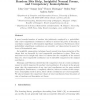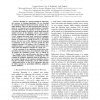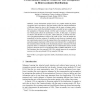180 search results - page 26 / 36 » Improved bounds on the sample complexity of learning |
COLT
2003
Springer
14 years 21 days ago
2003
Springer
A mere bounded number of random bits judiciously employed by a probabilistically correct algorithmic coordinator is shown to increase the power of learning to coordinate compared ...
CVPR
2009
IEEE
15 years 2 months ago
2009
IEEE
Active learning strategies can be useful when manual labeling
effort is scarce, as they select the most informative
examples to be annotated first. However, for visual category
...
FOCS
2010
IEEE
13 years 5 months ago
2010
IEEE
Boosting is a general method for improving the accuracy of learning algorithms. We use boosting to construct improved privacy-preserving synopses of an input database. These are da...
PODC
2009
ACM
14 years 8 months ago
2009
ACM
Performing random walks in networks is a fundamental primitive that has found applications in many areas of computer science, including distributed computing. In this paper, we fo...
ICB
2009
Springer
14 years 2 months ago
2009
Springer
Linear discriminant analysis (LDA) is a popular method in pattern recognition and is equivalent to Bayesian method when the sample distributions of different classes are obey to t...



